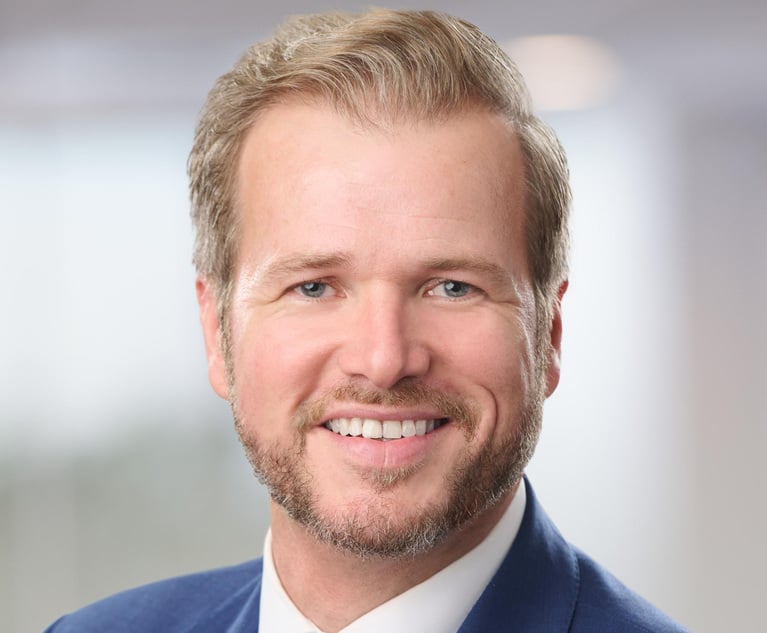 John N. Ellison, left, and Amy M. Koss, right, of Reed Smith. Courtesy photos
John N. Ellison, left, and Amy M. Koss, right, of Reed Smith. Courtesy photosThe Growing PFAS Morass: Why Insurance Should Cover These Products Liability Claims
With the increase in litigation and the newly minted state and federal regulations, companies of all types will likely be on the receiving end of an increased level of scrutiny from the public and the plaintiffs’ bar about potential claims involving products containing PFAS in some capacity.
November 21, 2024 at 01:07 PM
9 minute read
For the last few years, major companies and smaller businesses alike have found themselves at the center of lawsuits over per- and polyfluoroalkyl substances (PFAS), and these suits are only becoming more common. The litigation has moved up from targeting the manufacturers of PFAS at the ground floor—now consumer product companies in the beauty, health, and food industries are all under fire. Companies like 3M, DuPont, Corteva, and most recently, Carrier Global, have reached settlements in the billions of dollars for claims related to the manufacture and distribution of PFAS. Other industry giants like Almay, Covergirl, Health-Ade Kombucha, and Bolthouse Farms, just to name a few, have found themselves embroiled in suits seeking damages for bodily injury, property damage and other alleged injuries.
In April 2024, the Environmental Protection Agency (EPA) announced new regulations on these “forever chemicals” setting legally enforceable maximum concentration levels and requiring public water systems to monitor for PFAS compounds. In addition, the new regulations require public water facilities to provide the public with information about the levels of these chemicals in the water. The EPA also designated two types of PFAS as hazardous substances. Previously in February, the Food and Drug Administration announced a ban on food packaging containing PFAS. Several states have passed bills enacting bans on PFAS in a variety of products including children’s clothes and toys, cleaning products, plastics, personal care products like cosmetics and dental floss, and food packaging, mirroring the suits companies have seen ramping up in the last few years.
NOT FOR REPRINT
© 2025 ALM Global, LLC, All Rights Reserved. Request academic re-use from www.copyright.com. All other uses, submit a request to [email protected]. For more information visit Asset & Logo Licensing.
You Might Like
View All

Waiving a Liability Insurer’s Right to Subrogation—Is It Appropriate?


Third Circuit Predicts Pa. High Court's Application of 'Gallagher' and 'Donovan' in 'Mid-Century Insurance v. Werley'
12 minute readTrending Stories
- 1Cravath Hires Paul Weiss Antitrust Co-Chair
- 2Contract Technology Provider LegalOn Launches AI-powered Playbook Tool
- 3Court of Appeals Provides Comfort to Land Use Litigants Through the Relation Back Doctrine
- 4Amid the Tragedy of the L.A. Fires, a Lesson on the Value of Good Neighbors
- 5Democracy in Focus: New York State Court of Appeals Year in Review
Who Got The Work
J. Brugh Lower of Gibbons has entered an appearance for industrial equipment supplier Devco Corporation in a pending trademark infringement lawsuit. The suit, accusing the defendant of selling knock-off Graco products, was filed Dec. 18 in New Jersey District Court by Rivkin Radler on behalf of Graco Inc. and Graco Minnesota. The case, assigned to U.S. District Judge Zahid N. Quraishi, is 3:24-cv-11294, Graco Inc. et al v. Devco Corporation.
Who Got The Work
Rebecca Maller-Stein and Kent A. Yalowitz of Arnold & Porter Kaye Scholer have entered their appearances for Hanaco Venture Capital and its executives, Lior Prosor and David Frankel, in a pending securities lawsuit. The action, filed on Dec. 24 in New York Southern District Court by Zell, Aron & Co. on behalf of Goldeneye Advisors, accuses the defendants of negligently and fraudulently managing the plaintiff's $1 million investment. The case, assigned to U.S. District Judge Vernon S. Broderick, is 1:24-cv-09918, Goldeneye Advisors, LLC v. Hanaco Venture Capital, Ltd. et al.
Who Got The Work
Attorneys from A&O Shearman has stepped in as defense counsel for Toronto-Dominion Bank and other defendants in a pending securities class action. The suit, filed Dec. 11 in New York Southern District Court by Bleichmar Fonti & Auld, accuses the defendants of concealing the bank's 'pervasive' deficiencies in regards to its compliance with the Bank Secrecy Act and the quality of its anti-money laundering controls. The case, assigned to U.S. District Judge Arun Subramanian, is 1:24-cv-09445, Gonzalez v. The Toronto-Dominion Bank et al.
Who Got The Work
Crown Castle International, a Pennsylvania company providing shared communications infrastructure, has turned to Luke D. Wolf of Gordon Rees Scully Mansukhani to fend off a pending breach-of-contract lawsuit. The court action, filed Nov. 25 in Michigan Eastern District Court by Hooper Hathaway PC on behalf of The Town Residences LLC, accuses Crown Castle of failing to transfer approximately $30,000 in utility payments from T-Mobile in breach of a roof-top lease and assignment agreement. The case, assigned to U.S. District Judge Susan K. Declercq, is 2:24-cv-13131, The Town Residences LLC v. T-Mobile US, Inc. et al.
Who Got The Work
Wilfred P. Coronato and Daniel M. Schwartz of McCarter & English have stepped in as defense counsel to Electrolux Home Products Inc. in a pending product liability lawsuit. The court action, filed Nov. 26 in New York Eastern District Court by Poulos Lopiccolo PC and Nagel Rice LLP on behalf of David Stern, alleges that the defendant's refrigerators’ drawers and shelving repeatedly break and fall apart within months after purchase. The case, assigned to U.S. District Judge Joan M. Azrack, is 2:24-cv-08204, Stern v. Electrolux Home Products, Inc.
Featured Firms
Law Offices of Gary Martin Hays & Associates, P.C.
(470) 294-1674
Law Offices of Mark E. Salomone
(857) 444-6468
Smith & Hassler
(713) 739-1250





